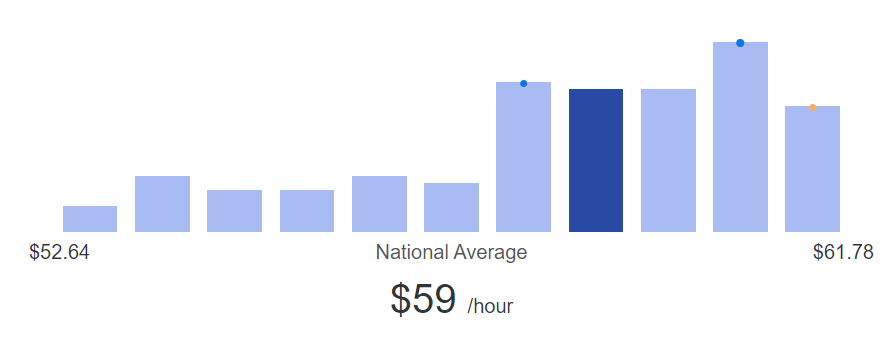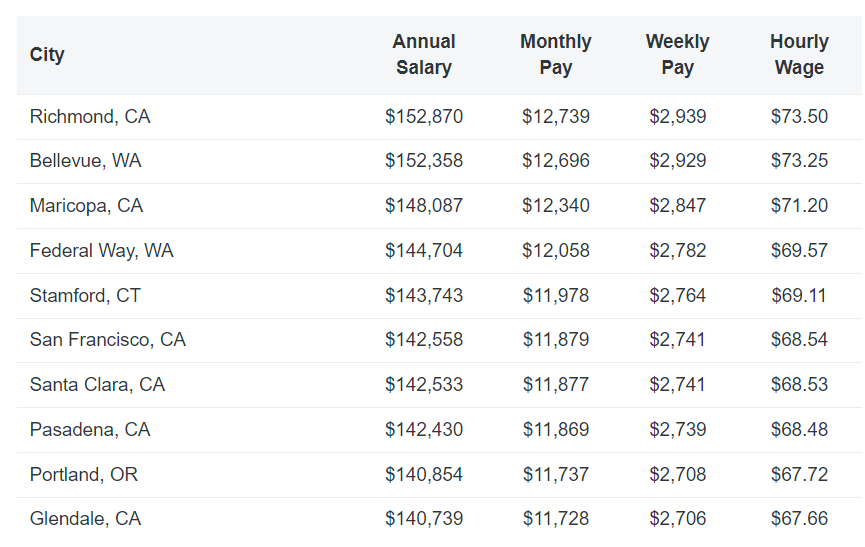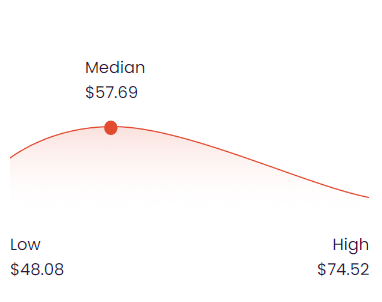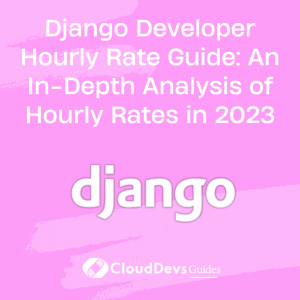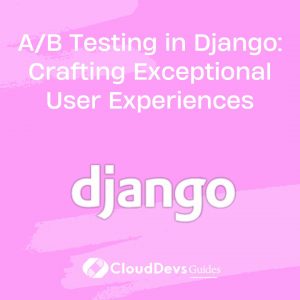Django Developer Hourly Rate Guide: An In-Depth Analysis of Hourly Rates
In the United States, Django developers’ average hourly rate is approximately $59, according to information provided by ZipRecruiter. This wage, however, isn’t a constant value and is subject to variation. For instance, less experienced Django developers or those living in areas with a lower cost of living tend to earn an hourly rate of $57, positioning them in the 25th percentile. On the other hand, seasoned Django developers in regions with a high demand for their skills can demand an hourly wage of $60, which places them in the 75th percentile.
Table of Contents
This guide is a helpful resource for businesses trying to hire Django developers as well as developers interested in learning about the financial situation of their profession. It aims to provide readers with the knowledge they need to make informed decisions about hiring or career advancement in the Django area.
Factors Affecting Django Developer Hourly Rates
Several factors play an important role in deciding Django developers’ hourly rates. Understanding these features can provide useful data, especially for employers looking to hire Django developers. These factors become much more important when hiring remote Django developers, as pricing can vary greatly depending on geographical location, experience, and technology stack. Knowing these rate-determining aspects is critical for businesses looking to hire dedicated Django developers to ensure a successful hiring process and project execution.
- Skillset: Django developers’ hourly rates are directly proportional to their expertise and skill set. A developer proficient in Python, Django, and front-end technologies such as JavaScript, HTML, and CSS can command a higher rate. Additional skills such as familiarity with RESTful APIs, databases (like PostgreSQL and MySQL), version control systems (like Git), and deployment tools (like Docker) can further increase their value.
- Experience Level: Experience also significantly influences the rates. An entry-level developer might charge less than a mid-level or a senior developer who has a comprehensive understanding of Django, Python, and other related technologies, and can manage complex projects independently.
- Location: Geographical location can impact the hourly rates due to the varying cost of living. Developers based in areas with a higher cost of living (like San Francisco or New York) often charge more than those in areas with a lower cost of living. However, with remote work becoming more prevalent, this factor might be less decisive than it once was.
- Project Type: The complexity, duration, and scope of the project will also influence the hourly rate. More complex projects requiring a deep understanding of Django, critical problem-solving skills, and longer commitments often come with higher rates.
- Supply and Demand: The principles of supply and demand also apply here. Given the high demand and relatively low supply of skilled Django developers, the hourly rates are often competitive.
- Certification and Education: While a degree in computer science or a related field is common among developers, additional certifications can also impact a Django developer’s hourly rate. For instance, a developer who has earned certifications in Python, Django, or other related fields, showcases their commitment to learning and staying updated with the latest industry trends. This can boost their market value, allowing them to command higher hourly rates.
- Reputation and Portfolio: The reputation of a developer can significantly influence their hourly rate. A developer with a proven track record of successful projects and excellent client reviews can charge more. Their portfolio speaks for their ability to deliver high-quality work, and this reduces the risk for the employer, who is likely willing to pay a premium for this assurance.
By considering these factors, businesses can better budget for Django development, and developers can gauge a fair rate for their work. In the next section, we’ll break down the Django developer hourly rates based on these factors.
Hourly Rates of Django Developers Across Different Experience Levels
Here’s a general breakdown of Django developer hourly rates based on experience level. Please note that these rates can vary widely depending on the factors previously mentioned, such as location, skill set, and project complexity.
| Experience Level | Average Hourly Rate |
|---|---|
| Entry-Level | $15 - $50 |
| Mid-Level | $50 - $100 |
| Senior-Level | $100 - $200 |
- Entry-Level Django Developers: Entry-level developers are those who are just starting their careers in Django development, typically having less than 2 years of experience. They are still building their skills and often require some level of supervision or guidance.
- Mid-Level Django Developers: These developers typically have 2-5 years of experience. They are more autonomous, possess a deeper understanding of Django and related technologies, and can handle more complex tasks.
- Senior-Level Django Developers: Senior developers usually have over 5 years of experience and offer a high level of expertise. They are capable of handling complex projects, leading teams, and making critical project decisions.
Thus, the statistics from ZipRecruiter further suggest that though there is an average national hourly rate of $59 in the United States, there is a difference of about nine dollars between the minimum hourly rate and the maximum hourly rate obtained by Django developers across the United States.
Additionally, the below table from ZipRecruiter provides the top ten cities in the United States offering the highest salary and hourly rate for Django developers. According to this Richmond CA offers the highest salary for Django developers, followed by Bellevue, and Maricopa.
According to talent.com, the hourly rate of a Django developer across the North American region is $57.69 which is about $120K per year. Hence, a beginner Django developer earns about $48.08 while a senior Django developer earns about $74.52.
Influence of Location on Django Developer Hourly Rates
The location has a major effect on Django developers’ hourly rates, owing to differences in the cost of living and local market conditions. This is a significant aspect for companies looking to hire Django developers. Furthermore, it is especially important when hiring remote Django developers because they can be located anywhere in the world, resulting in a large range of potential rates. Recognizing these regional influences can help businesses budget and strategize their employment procedures more successfully.
| Region | Average Hourly Rate |
|---|---|
| North America | $60 - $200 |
| Western Europe | $50 - $150 |
| Australia | $50 - $150 |
| Eastern Europe | $20 - $80 |
| Asian | $15 - $60 |
| South America | $20 - $70 |
| Africa | $15 - $50 |
As seen from the table above:
- In North America and Western Europe, rates are generally higher, ranging from $60 to over $200 and $50 to $150 per hour, respectively, because of higher living costs. In Australia, developers’ rates are similar to those in Western Europe.
- Eastern Europe, with its robust tech talent pool and lower living costs, offers competitive rates ranging from $20 to $80 per hour. In Asian countries, rates are typically lower due to lower living costs, with rates ranging from $15 to $60 per hour.
- South American countries, with growing tech industries, offer rates typically ranging between $20 to $70 per hour. African countries, also experiencing growth in their tech industries, have the lowest rates generally from $15 to $50 per hour.
Django Developer Hourly Rate VS Other Technologies
When comparing Django developer hourly rates with those of other technologies, it’s essential to consider the complexity, versatility, and demand for each technology. Here’s a rough comparison:
| Technology | Average Hourly Rate |
|---|---|
| Ruby On Rails | $60 - $160 |
| React.js | $60 - $180 |
| Node.js | $60 - $180 |
| PHP/Laravel | $40 - $120 |
| Java/Spring | $70 - $200 |
As can be seen, Java developers, particularly those proficient in Spring, might command higher rates due to the complexity of the language and its widespread use in enterprise-level applications. Node.js, React.js, and Rails developers’ hourly rates are comparable to the rates of Django developers. They might command slightly higher rates in some markets. Due to the larger supply of PHP developers and its perception as a less-modern language PHP/Laravel developers generally have lower rates compared to Django developers.
How Backend Technologies Affect Django Developer Hourly Rates
This information is especially useful when looking to hire dedicated Django developers, as their knowledge of specific backend technologies can have a big impact on the value they contribute to a project and, as a result, their hourly costs. Businesses can make informed recruiting decisions if they understand these rates. Here’s a general estimate for the hourly pricing of Django developers skilled in specific backend technologies, which is an important consideration for businesses wanting to hire Django developers:
| Technology | Average Hourly Rate |
|---|---|
| PostgreSQL | $50 - $150 |
| MySQL | $50 - $140 |
| MongoDB | $60 - $160 |
| Django REST Framework | $70 - $180 |
| AWS | $80 - $200 |
| Docker | $75 - $190 |
| DevOps | $80 - $200 |
As seen from the table above, the Django developer’s rate is comparable to the rates of other backend technologies like PostgreSQL, MySQL, and MongoDB. It is significantly less expensive than technologies such as Django REST Framework and Docker. On the other hand, AWS and DevOps charge an average hourly rate of $80 – $200, which is more expensive than other backend technologies.
Hourly Rates of Django Developers Based on Tech Stack
The tech stack that a Django developer is proficient in can significantly influence their hourly rates. Here’s a general guideline:
| Tech Stack | Average Hourly Rate |
|---|---|
| Basic Django Tech Stack | $20 - $100 |
| Intermediate Django Tech Stack | $50 - $150 |
| Advanced Django Tech Stack | $80 - $200 |
- Basic Django Tech Stack: Developers with expertise in Python, Django, and a basic understanding of front-end technologies like HTML, CSS, and JavaScript typically charge $20 to $100 per hour.
- Intermediate Django Tech Stack: If a Django developer is also experienced with front-end frameworks like React or Vue, databases like PostgreSQL or MySQL, and version control systems like Git, their hourly rate might range from $50 to $150.
- Advanced Django Tech Stack: Developers skilled in Django REST Framework for building APIs, cloud platforms like AWS or Google Cloud, containerization tools like Docker, or familiar with DevOps practices, can command even higher rates, typically ranging from $80 to $200+ per hour.
Conclusion
In conclusion, the hourly rates of Django developers are not just a reflection of their expertise but also a testament to the increasing demand for their skills in the tech industry. As businesses continue to leverage Django’s capabilities in crafting scalable, efficient, and versatile web applications, the need for skilled Django developers remains on the rise. This surge in demand translates into promising earning potential for developers proficient in Django.
Understanding your worth as a Django developer is crucial when navigating employment opportunities. If you are considering a career in Django development or hiring Django talent, it’s essential to be well-informed about the market rates. Our website offers a comprehensive guide on Django developer annual salary to help you gauge your expectations.
When seeking to hire Django developers for your projects, several factors come into play. These include their experience level, geographic location, and the specific requirements of your project. By aligning these factors, you can identify and attract the perfect Django developer, one who possesses the necessary skills and expertise to contribute to your project’s success. To facilitate this process, we have also curated a list of valuable resources on our website, such as the Django developer hiring guide, Django developer job description guide, and the Django developer interview questions that can assist you within your Django developer hiring process.
Table of Contents




